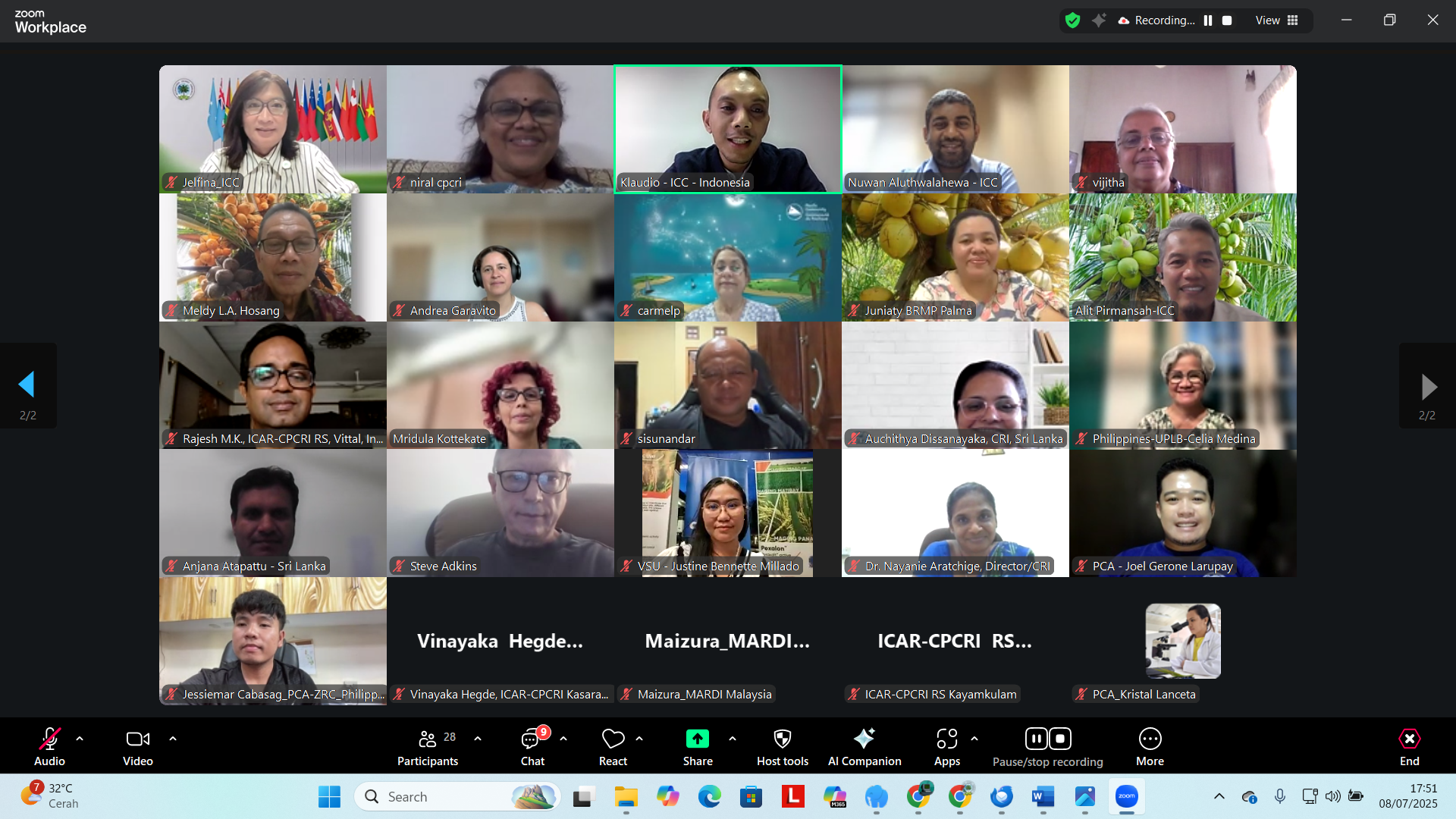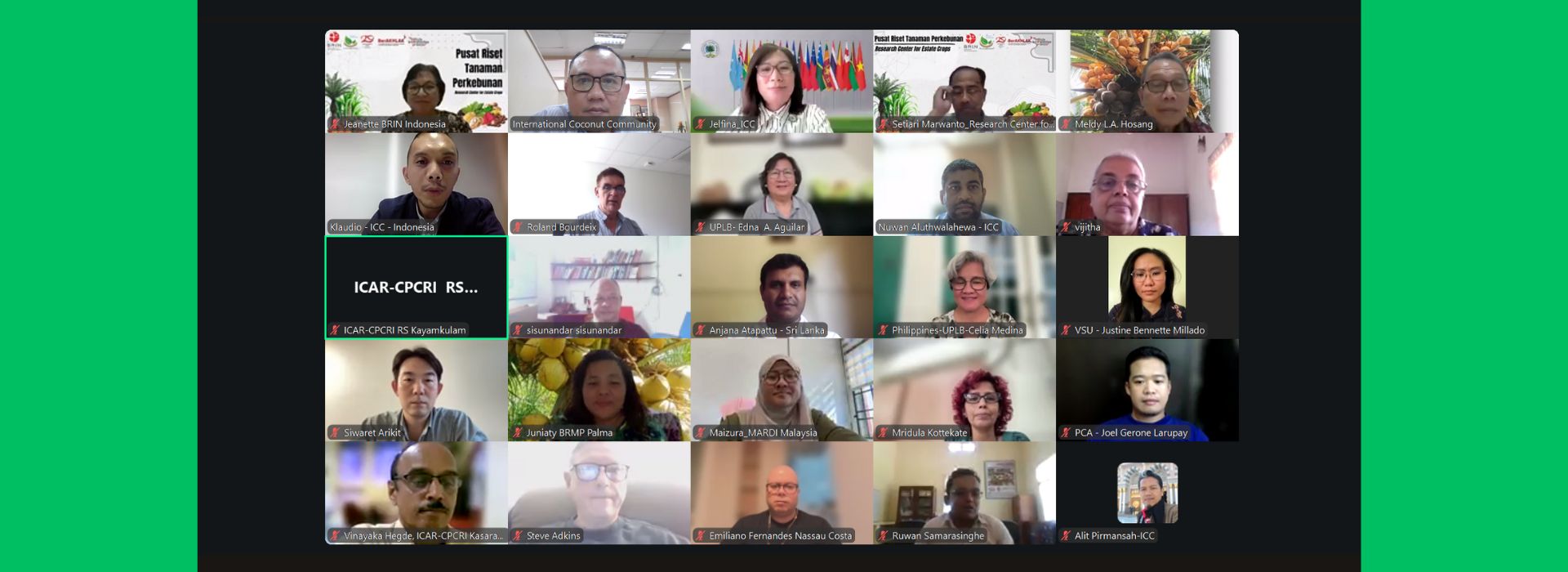Jakarta, 8 July 2025 – The International Coconut Community (ICC), in its continuing effort to enhance the conservation and utilization of coconut genetic resources, successfully convened the Coordination Meeting of the International Thematic Action Groups (ITAGs) of ICC-COGENT through a virtual platform. The meeting brought together all ITAG leaders and members, comprising leading scientists, researchers, technical partners, and stakeholders from around the world who are working with coconut genetic resources, to evaluate progress, align thematic strategies, and plan upcoming collaborative initiatives.
Held from 3:00 PM to 6:00 PM Jakarta time, the virtual meeting served as a timely follow-up to the ITAG strategic planning session held in Kuala Lumpur in 2022. Participants included ITAG team leaders, representatives from research institutions and national genebanks, and invited observers from the broader coconut research community.
Opening the meeting, ICC Director General Dr. Jelfina C. Alouw extended a warm welcome to all participants and emphasized the significance of coordinated international action in safeguarding coconut biodiversity. She highlighted the growing challenges facing the global coconut sector, from aging plantations and emerging pests to limited supply and changing climatic conditions, and underscored the need for science-led solutions. Dr. Jelfina stressed that ICC, as the coordinating body of COGENT since 2019, views the ITAGs as critical engines for technical leadership and knowledge exchange. She encouraged the groups to focus on actionable goals, harmonized technical outputs, and realistic timelines. “We must work collectively, not only to develop protocols and reports, but to generate lasting impact at the field level and ensure the future sustainability of the coconut industry,” she stated.

Following the opening, Mr. A.H.N. Chinthaka, ICC Deputy Director General, initiated the technical session with a presentation reviewing action points identified at the 2022 ITAG meeting. He provided a thematic summary of progress made and gaps remaining, setting the stage for a more focused exchange during the rest of the meeting.
The ITAG mechanism under COGENT is organized into four thematic areas: ITAG 01 on ex-situ and in-situ conservation; ITAG 02 on coconut genomics and breeding; ITAG 03 on phytopathology, entomology, and germplasm movement; and ITAG 04 on tissue culture and cryopreservation. Each group is composed of experts with deep experience in their respective areas, drawn from member countries and partner organizations.
Presenting on behalf of ITAG 01, Dr. Niral Vittal provided a detailed update on efforts to enhance genetic conservation practices across coconut genebanks. She emphasized the importance of standardizing genebank protocols, developing digital tools to track accessions, and building a harmonized germplasm database for ICGs and NCGs. She further noted that complementary conservation strategies such as cryopreservation and on-farm conservation are vital to ensuring long-term germplasm security. Later, Dr. Niral also introduced the roadmap for the upcoming International Workshop on Strengthening Coconut Genebanks, scheduled for September in India, which aims to strengthen global coordination and establish common best practices.
Next, Dr. Siwaret Arikit, team leader of ITAG 02, outlined his group's focus on genomic mapping and the integration of molecular tools into breeding programs. He proposed the organization of a hands-on regional workshop on coconut genomics and bioinformatics, designed to train researchers in sequencing data analysis, marker-assisted selection, and QTL mapping. Dr. Siwaret discussed the importance of identifying elite accessions from existing genebank collections, using molecular markers for authenticity verification, and conducting breeding research to improve tolerance to biotic and abiotic stresses. His presentation underscored the need to equip national teams with genomic competencies to accelerate cultivar development. Representing ITAG 03, Dr. Wayne Mayrie highlighted the increasing threat of pest and disease outbreaks, noting the urgency of establishing harmonized phytosanitary protocols for germplasm exchange and management. He elaborated on the importance of surveillance systems, pest forecasting models, and early warning frameworks to manage the spread of pathogens such as lethal yellowing diseases, coconut rhinoceros beetle, and phytoplasmas. Dr. Wayne proposed the creation of a regional research network under the ICC-IPM platform and emphasized the need for research on resistant varieties and localized integrated pest management strategies. His recommendations included hosting webinars to foster knowledge exchange and building diagnostic capabilities in key member countries.
The fourth ITAG update was presented by Dr. Vijitha Vidhanaarachchi, who provided an overview of current developments in tissue culture and cryopreservation. She explained that while embryo culture is already practiced in several countries, other protocols—such as somatic embryogenesis and cryopreservation—remain at the experimental stage and require further refinement. Dr. Vijitha emphasized the importance of validating protocols across institutions and providing training opportunities for junior researchers. She noted that Mexico remains one of the few countries to have advanced somatic embryogenesis protocols to commercial scale. The ITAG 04 team continues to work on standardizing tissue culture techniques and exploring partnerships with private sector stakeholders to scale up production and application.
A special highlight of the meeting was the presentation of the unified tissue collection protocol for coconut DNA sampling, jointly delivered by Dr. Andrea Garavito of CIRAD and developed with the initial guidance of Dr. Roland Bourdeix. Dr. Andrea explained that the proposed protocol aims to harmonize sample collection, processing, and preservation methods across different genebank sites, enabling more accurate and reliable genomic research. She elaborated on the different types of tissue that could be used, the appropriate storage techniques for DNA and RNA sequencing, and the technical limitations of various methods. The draft protocol will be circulated among ITAG members for review and finalization, with the expectation that it will serve as a reference for future genomic and breeding initiatives.
Following the technical presentations, the floor was opened for discussion on proposed ITAG workplans for the 2025–2026 period. Participants discussed priorities such as developing regional databases, finalizing common protocols, improving communication between ITAGs, and identifying funding mechanisms for joint research. Several members emphasized the importance of including early-career scientists in capacity-building activities and ensuring equitable access to training and research resources. During this segment, Dr. Niral also presented updates on preparations for the International Workshop on Strengthening Coconut Genebanks for a Climate-Resilient and Sustainable Future, to be held from 2–5 September 2025 in ICAR-CPCRI, Kasaragod, India, in collaboration with the ICAR-CPCRI of India. The event will feature technical sessions on genebank operations, policy harmonization, stakeholder dialogue, and presentations from young researchers. It is expected to attract participants from national programs, donor agencies, and international research institutions. Hybrid participation options will be provided to accommodate wider attendance.
The meeting concluded with remarks from Mr. Chinthaka, who thanked all ITAG leaders and contributors for their presentations and insights. He summarized the key outcomes, which include follow-up on country representative submissions, coordination for the workshop, and continued development of protocols and project proposals. He reaffirmed that the ICC Secretariat remains committed to supporting ITAG activities through digital platforms, technical coordination, and facilitation of funding opportunities.
In closing, Dr. Jelfina reiterated the importance of maintaining momentum. She encouraged all participants to stay engaged, continue cross-ITAG collaboration, and focus on producing outcomes that benefit coconut farmers and the wider sector. “The strength of our network lies in the passion and professionalism of our experts. Let us continue to work as one team, with one shared goal—securing a sustainable future for coconut genetic resources,” she concluded.
With renewed commitment and a clear vision ahead, the ITAG Coordination Meeting reaffirmed ICC’s leadership in fostering regional and global collaboration to support the science, conservation, and innovation that underpin the future of the coconut sector.

